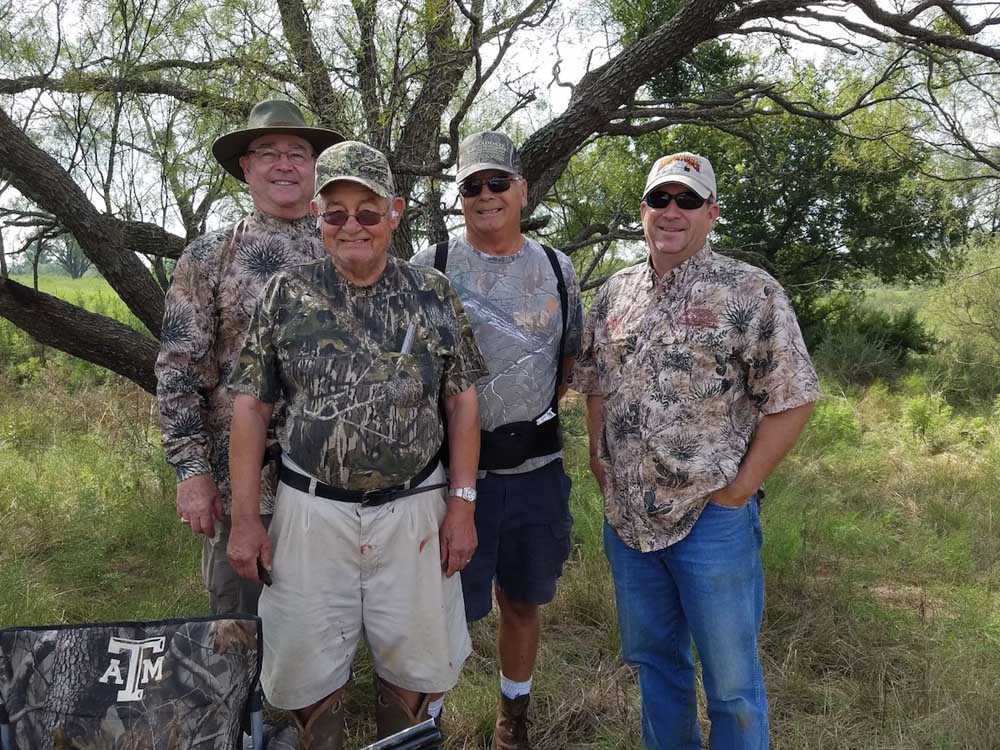Job Well Done: Kerens’ Ron Speed took a dream and made it an industry
Published 2:46 pm Friday, November 25, 2022

- Ron Speed Sr. grew up fishing and hunting around his home in Kerens. Hunting remained a passion as he hunted quail and championed bird dogs and dove hunting. This photo was taken with friends on his last dove hunt several years ago.
If you have ever had the opportunity to bass fish south of the border, or even thought about it, you have Ron Speed Sr. to thank.
The Kerens native, who passed away earlier this month at the age of 83, was a pioneer in the destination bass fishing industry. In a career as an outfitter spanning more than 40 years, he hosted starting in Mexico before branching out to Canada, Cuba, the Yucatan and South America.
Trending
After graduating from Texas A&M, Speed became a high school football coach, often with one provision, the schools he worked at often had to be near a lake, Goliad for Falcon, Hemphill for Toledo Bend, where he also guided in the offseason, and Malakoff for Cedar Creek.
In the summer of 1970, Speed and some other coaches caravanned from Texas to Lake Dominguez in the Mexican state of Sinaloa. After one of his then-best fishing trips, he came home with a wild thought that others might like going. With nothing more than a coach’s pay to work with, he knew he needed friends with money willing to spend it on an unproven idea. He found them in Hugh Walters of Yellowpine and Travis Proctor of Dallas and formed S&W Fishing that eventually became Ron Speed Adventures.
Working with little more than a hand-crafted pamphlet he sent to tackle stores and boat dealers around the state, the concept got off to a crawl until a large group from Austin booked a trip. Hoping this would be the breakthrough the fledgling operation needed, Speed decided to charter a flight to simplify travel to the lake in the days of limited air travel.
With 18 fishermen aboard a World War II era DC-3 prop plane, all was going well until they heard a clunk and the plane jerked. Shortly after, the co-pilot walked back to Speed and quietly explained he didn’t want to alarm anyone, but the plane had lost an engine. He was confident, however, that they would still be able to make their destination.
“It wasn’t five minutes later they felt another herky-jerky motion. The co-pilot came running back and said they lost both engines and to put your seat belts on and put your head between your legs,” Ron Speed Jr. said, recalling his dad’s account of the day.
Sitting next to his old high school football coach, Tommy Phillips, the elder Speed stoically said he did not think it was their day to die, and was proven prophetic when the pilot found a small patch of caliche road in the mountains to set the plane down in what could only be called a controlled crash landing.
Trending
The fishermen huddled under the shade of one of the plane’s wings until an old school bus taxi came by. Speed offered the local passengers $10 each to change places with the fishermen and the trip was back on.
“The fishing was OK, but it needed to be beyond great to overcome the plane crash,” Speed Jr., who took over the company in 2012, said.
As Dominguez’ fishing was playing out, Speed had another airplane encounter. This time instead of a crash, it was the start of making him the leader in the industry he became.
It was the summer of 1972 and Speed was flying home from Mexico when he started talking with the man in the next seat, Jose “Pepe” Martinez. Learning Speed was a fishing outfitter, he told him about a new 95,000-acre lake in Tamaulipas, Lake Guerrero. Martinez invited Speed down to fish the still unopened lake and talk about a partnership.
“He didn’t wait a month,” Speed Jr. said. “He set up a date and went down to Ciudad Victoria. Pepe had set up a boat and guide, and the first day he caught 150 fish. Nothing big, but up to 5 pounds and lots of 4s. He said this is it, but I have to give up coaching football because my ship has come in.”
Speed finished the 1972 Hemphill football season, and in January 1973 was operating Ron Speed’s Adventures.
He first opened El Sargento lodge in 1974. Later, a second facility, La Retama, was added. The oil and gas industry was booming in Texas, and the lodges were booking 100 to 150 people a week.
Over the next nine years he added operations at other Mexican lakes like Palmetto and Don Martín, he added tarpon and snook fishing in the Yucatán, two lakes in Canada and a successful bass fishing business in Cuba until it was shut down by changing U.S. government policy.
In 1983, feeling burnout after years of travel and some difficult dealings with partners, Speed suddenly shuttered the business. He moved his energies into other things like the cattle business, a video store, quail dog competitions and his life-long love of catfish fishing.
That lasted until 1987 when he got a call from Roberto Balderrama, the then director of tourism for the state of Sinaloa and Speed’s future business partner, about setting up an operation on Lake Comedero.
In what could be at times a difficult father/son working relationship, Speed Jr. had left the business once, but was coerced to return by a new Mexico lake.
“He said he was going to start me off at minimum wage and I was going to have to earn it. I left the company again in 2001 and I was still making minimum wage and I was the president,” Speed Jr. laughed.
The Comedero operation was an instant success with the lake producing both numbers and size. El Salto was also added. So was the addition of a peacock bass fishing adventure into South America.
Eventually Speed Jr. again joined the company in 2007 after his dad told him he was going to retire. It was not until 2012 after being pitched from a horse while working dogs and already beginning to suffer the effects of dementia that the elder Speed retired, although he still came to the office located in his house daily.
Raised within humble means in Kerens, from a kid Speed had a key to the outdoors, and eventually that key opened the door to a legendary business that has introduced fishermen to destination fishing for trips of a lifetime.






